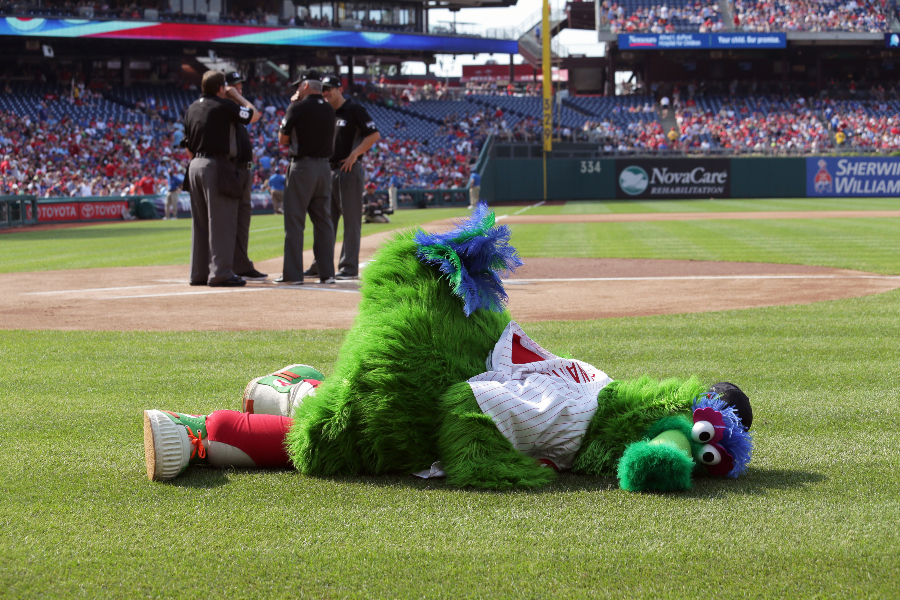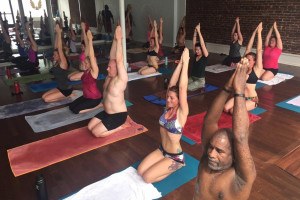How to Rebound From All the Sleep You Lost During the World Series
Because we're all really tired.

Feeling sleep-deprived because of the World Series? Here’s how to recover. / Photograph by Hunter Martin via Getty Images.
The past few months have been an exhilarating time for Philly sports fans. The Eagles are currently undefeated, the Union made it to the MLS Championship, and the Phillies made it to the World Series for the first time in 13 years.
The last accomplishment in particular was an exhausting road for fans, as we cheered on the Fightins nonstop for four straight weeks, attended any postseason game we could snag tickets to, partied our butts off up and down Broad Street, sang “Dancing On My Own” ad nauseum, and stayed up wayyyy past our bedtime for those anxiety-inducing championship games.
I remember doing all this — minus singing Robyn’s anthem in baseball settings — over a decade ago when the Phillies made it to the World Series back in 2008 and 2009. I was a spry college student then, who could function on very little sleep. But now, I’m in my 30s and don’t party as hard as I used to (okay, at all) and if I don’t get nine hours of sleep, I feel like one of those Victorian-era socialites who can’t get up from her fainting couch. And I feel for all the parents who were awake past midnight and then got woken up at the ass-crack of dawn by kids this time around. Sounds like an actual nightmare.
The acute post-World Series exhaustion pretty much all of Philadelphia is feeling right now has a lot to do with late start times that extended games past midnight, yes. But it also has to do with the fact that high-stakes sporting events often get our adrenaline pumping and activate our sympathetic nervous system (a.k.a. our flight-or-fight response), which can result in elevated heart rate, increased sweating, and difficulty falling and/or staying asleep throughout the night, says Philip Gehrman, associate professor of clinical psychology in psychiatry at the University of Pennsylvania’s Perelman School of Medicine.
Emotions also play a major role, especially as we’re cycling through big ones like elation, frustration, panic, excitement and disappointment over the course of a few hours. (What a roller coaster, amiright?) “These fluctuations of emotions give us a feeling of unrest, making it difficult for the brain to wind down and allow you to fall asleep peacefully,” says Thanuja Hamilton, board-certified sleep medicine specialist with Advocare Pulmonary and Sleep Physicians of South Jersey. “Even if you do fall asleep from exhaustion, your brain is still firing off emotions that can prevent you from going into a deep, well rested sleep. If you aren’t settled, how can your brain and body be settled?”
And then there’s the increased screen time and alcohol-drinking. Blue wavelengths from your television can prevent your melatonin from being secreted, which helps you naturally fall and stay asleep, Hamilton says. And having even one drink can disrupt your ability to achieve REM, the most restful type of sleep.

Being a Philly sports fan is exhausting! / Photograph by Philly Mag lifestyle editor Erica Moody of her daughter.
You might be thinking to yourself, Okay, but the World Series is OVER and I’m tired right now. What can I do?! Bad news: There is no substitute for having enough hours of sleep to feel rested, Gehrman says. “You don’t make up for sleep on an hour-to-hour basis,” he explains. “If you lose four hours of sleep [one night], you won’t then sleep an extra four hours when you have the opportunity.” Basically, sleep doesn’t work like a bank — you can’t withdraw some hours and then replenish the deficit at a later date and expect to break even.
There are some silver linings, though. After partial deprivation (which is what you’re likely experiencing this week), your sleep might end up being deeper and more intense. This “recovery sleep,” as Gehrman says it’s called, can help you feel a bit more rested than you’ve felt of late. Hamilton adds that a short nap can ease exhaustion, but to limit the nap to 20 to 30 minutes. “Otherwise, you’ll dip into nighttime sleep or will enter deeper stages of sleep that’ll leave you groggy when you wake up.”
Another tip: Ease into your sleep schedule like you might do for jet-lag bouts. “Some people think that getting into bed two hours earlier than usual will help them catch up, but you’re confusing your brain and your circadian rhythm gets off cycle,” Hamilton says. Instead, go to bed 15 minutes early for a week at a time until you’re at your desired sleep time. Gehrman adds that you should pay attention to what time of the day you feel most tired, and plan to get your body moving via exercise or an outdoor walk to temporarily counter the exhaustion. And finally, enact a nighttime screen-free ritual. Put the phone away and turn the television off, and grab a book, do your skincare routine, journal, or listen to some mellow music before catching those much-needed Zs.
The Phils may have lost and we all might be in denial or crying for the foreseeable future, but something we don’t need to carry with us much longer is our exhaustion. Now go to bed, ya sleepy heads!


